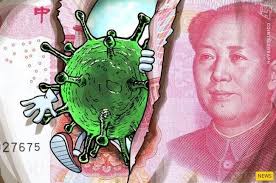It comes after both China and Korea last month began disinfecting and isolating used banknotes as part of their efforts to stop the spread of the virus.
Officials used ultraviolet light or high temperatures to sterilise the bills, only putting them back into circulation after they had been sealed and stored for up to 14 days.
A source at the Bank of England insisted there were no plans to do the same in the UK.
However the World Health Organization said the British public should exercise care when handling potentially infectious banknotes.
Asked whether banknotes could be spreading coronavirus, a WHO spokesman replied: "Yes it’s possible and it’s a good question. We know that money changes hands frequently and can pick up all sorts of bacteria and viruses and things like that.
"We would advise people to wash their hands after handling banknotes, and avoid touching their face.
"When possible it’s a good idea to use contactless payments."
Exactly how long the new coronavirus can survive outside the human body has not yet been proven.
An analysis of 22 earlier studies of similar coronaviruses, including Severe acute respiratory syndrome (Sars) and the Middle East respiratory syndrome (Mers) published online this month in the Journal of Hospital Infection, concluded that human coronaviruses can remain infectious on inanimate surfaces for up to nine days at room temperature.
However, they can quickly be rendered inactive by the use of common disinfectants, and may also dissipate at higher temperatures, the authors wrote. It is not yet clear, however, whether the new coronavirus behaves in a similar way.
A Bank of England spokesman said: "Like any other surface that large numbers of people come into contact with, notes can carry bacteria or viruses.”
However, the risk posed by handling a polymer note is no greater than touching any other common surface, such as handrails, doorknobs or credit cards."
source: Guardian

 Banknotes may be spreading the new coronavirus so people should try to use contactless payments instead, the World Health Organization has said. Customers should wash their hands after touching banknotes because infectious Covid-19 may cling to the surface for a number of days, the United Nations agency said on Tuesday.
Banknotes may be spreading the new coronavirus so people should try to use contactless payments instead, the World Health Organization has said. Customers should wash their hands after touching banknotes because infectious Covid-19 may cling to the surface for a number of days, the United Nations agency said on Tuesday.




